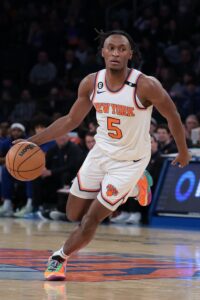After a difficult season with the Grizzlies, Dillon Brooks feels rejuvenated by his World Cup experience, writes Antonis Stroggylakis of Eurohoops. Brooks has moved past the acrimonious ending of his time in Memphis and is enjoying a summer that has included an $86MM contract with the Rockets and a chance to lead Canada to new heights in international competition.
Brooks had 22 points and five rebounds while playing his usual disruptive defense in Sunday’s win over Spain, moving Canada into the quarterfinal round and wrapping up a spot in the Olympics. The Canadians trailed by 12 points entering the fourth quarter, but Brooks hit three three-pointers during a rally in the must-win game.
“Coming off a tough year with my old squad, it was great having a refresh with Canadian blood,” Brooks said. “Guys who believe in me. Guys who trust in me.”
Reaching the Olympics is a life-long dream for Canadian teammate Shai Gilgeous-Alexander, whose mother, Charmaine Gilgeous, competed for Antigua and Barbuda in the 400 meters during the 1992 games, Stroggylakis adds.
“In my whole life I knew what’s like going to the Olympics because of that,” Gilgeous-Alexander said. “And I know the best athletes are there.”
There’s more from the World Cup:
- Former NBA big man Donatas Motiejunas tells Aris Barkis of Eurohoops that beating Team USA on Sunday compares to Lithuania’s last victory over the Americans in the 2004 Olympics. “I was a kid at that time, I was 14 years old so I remember watching the game and it was something spectacular,” he said. “Like I said from the first day we are here to bring joy to our people, to our basketball and I know how crazy it’s right now in Lithuania. And I really loved that we, as a team, can bring this joy to our people.”
- Germany reached the quarterfinals without Magic forward Franz Wagner, who suffered a sprained ankle in the opening game, and it appears his status for Wednesday’s contest against Latvia won’t be decided until shortly before game time, per Cesare Milanti of Eurohoops. Wagner is considered day to day, but he hasn’t been active since the injury. “He had no team practice yet. We’re gonna have to see what his situation is tomorrow, and the medical staff will make a decision on Wednesday,” Germany head coach Gordon Herbert told reporters. “We go day by day; we have to see how his ankle feels in the morning, see if he’s able tomorrow or not, and we go from there. It’s a process. He wants to play, but he’s pretty frustrated and disappointed he can’t play.”
- Along with Mavericks star Luka Doncic, one of Slovenia’s most important players has been center Mike Tobey, who obtained a passport in advance of the 2020 Olympic qualifying tournament, Milanti adds in another piece. Tobey believes naturalized players will have an increased impact in international basketball. “I understand both sides of the rule,” he said. “For me, I think it helps make teams competitive. I’m sure in the future the national teams will do it more because sometimes teams are really just a piece away. Slovenia shows it’s just adding one person in the position they don’t have as many big guys in this generation. I think it can make a big difference, and help small countries compete.”
 Let’s use Knicks guard
Let’s use Knicks guard